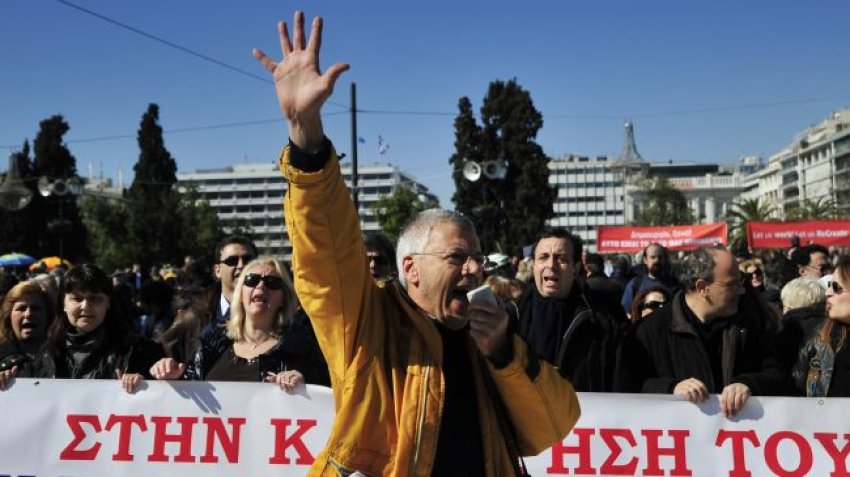
The rulers of the world are panicking over the results of Greek democracy.
As stock markets plummet globally, the crisis in Greece has become the main item for discussion for the world’s most powerful politicians at the May 19-20 G8 meeting at the US presidential retreat, Camp David.
The cause of the alarm is the results of the May 6 elections. The traditional parties' vote slumped.
Voters rejected the harsh austerity measures imposed by the “troika” of the International Monetary Fund, the European Central Bank and the European Union, in exchange for bailing out Greece’s creditors.
New elections will take place on June 17 as no party was able to form a government. The most successful of the anti-austerity parties, the left-wing coalition SYRIZA, which won the second largest vote (16.76%), made rejection of the austerity measures non-negotiable.
Opinion polls suggest the vote for SYRIZA will be higher on June 17, possibly making it the largest party in parliament. The May 18 Guardian said it was “enjoying ratings of more than 25% in polls”.
The discussions at the G8 meeting -- like most of the worried speculation in the financial media -- will focus on whether Greece leaves the eurozone (the group of EU countries with the euro as their shared currency).
They are threatening to expel Greece from the eurozone if it refuses to continue implementing austerity -- a threat to underline the message there is no possible alternative to the bailouts and austerity measures.
To the bankers and their mouthpieces in politics and the media, Greece’s “sovereign debt” (money owed by the government) makes these demands reasonable.
A May 18 Seattle Times editorial said: “Greece could default within the eurozone and have much of its debt written off.
But Greece is a living, breathing moral hazard. What message would it send to Italy, Spain, Ireland and Portugal -- all undertaking difficult austerity programs if the European Union provided special treatment to its least trustworthy member?
It described the voter rejection of pro-austerity parties as evidence of “a political system apparently incapable of responsibility”.
A May 18 opinion piece in the Canadian National Post was cruder, describing the Greek population as “spoiled brats”.
It called the Greek people “deadbeats, willing to go to any lengths to get out from under their share of the burden” who had “enjoyed free rides for years” but “being asked to pay their share of the tab … are refusing to do so”.
However, Greece’s “sovereign debt crisis” is not the result of high public spending. It is a continuation of the 2008 meltdown of the Western banking system.
During the decades that finance capital fuelled (and obtained vast fortunes from) the speculative bubble economy, the mantras of neoliberal deregulation ensured that any suggestion of accountability from, or oversight of, the banks was dismissed as unacceptable interference in the economy.
When the bubble inevitably burst, governments doled out trillions of dollars to big banks on the grounds that solvent banks were an economic necessity. The finance industry’s debts became sovereign debt and austerity programs the means by which ordinary people would pay the bankers’ bills.
The myth that Greece and other southern European countries lack a work ethic falls down when facts are introduced.
OECD data for 2008 showed that Greeks worked, on average, 2120 hours a year, higher than any OECD country apart from South Korea. This is 356 hours more than the OECD average, 690 hours more than Germany and 467 hours more than Britain.
In 2005, the EU statistical agency Eurostat reported that the average age of retirement in Greece was 61.7, higher than Germany, France and Italy.
Since the first Memorandum of Understanding was signed between the Greek government and the troika in May 2010, the Greek people have been paying heavily for the bankers' recklessness.
They have suffered wholesale privatisation, huge cutbacks to public services and a 40% fall in wages and pensions in many cases.
Official unemployment is 22%, youth unemployment 51%, and 40% of the population now lives under the poverty line. The suicide rate rose by 40% last year.
The Greek people responded to the attacks with general strikes, mass demonstrations, occupations of public spaces and even, in the case of 77-year-old pensioner Dimitris Christoulas, public suicide.
In his suicide note, Christoulas said: “I can’t see another solution but a dignified end to my life before I start scavenging rubbish bins for food.
“I believe that young people with no future will one day take up arms and hang the national traitors upside down in Syntagma Square, as the Italians did to Mussolini in 1945.”
In November, the troika imposed an unelected “technocratic” government supported by the two main parties, PASOK and New Democracy, as well as the racist far-right LAOS party.
This unelected government signed a second memorandum this year. This was soundly rejected at the May 6 elections.
If implemented, the minimum wage would be cut to €200 (A$260) a month and 150,000 public sector workers would be sacked. It is likely hundreds of thousands of homes would be seized due to an inability to pay mortgages.
In response, the Greek ruling class and media have been fuelling anti-immigrant racism. The chauvinist mythology of the international elites’ narrative of responsible German banks bailing out lazy Greeks has also fuelled xenophobia in Greece.
The anti-immigration LAOS party was punished for its role in the pro-austerity "technocratic" government and lost all its parliamentary seats in the May 6 vote. But 7% of the vote — and 21 seats went to Golden Dawn, a sinister neo-Nazi outfit with a record of violence against migrants and leftists.
However, SYRIZA is leader, Alexis Tsipras, told the May 18 Guardian that the conflict was “not between nations and peoples”.
“On the one side there are workers and a majority of people and on the other are global capitalists, bankers, profiteers on stock exchanges, the big funds.
“It's a war between peoples and capitalism.”